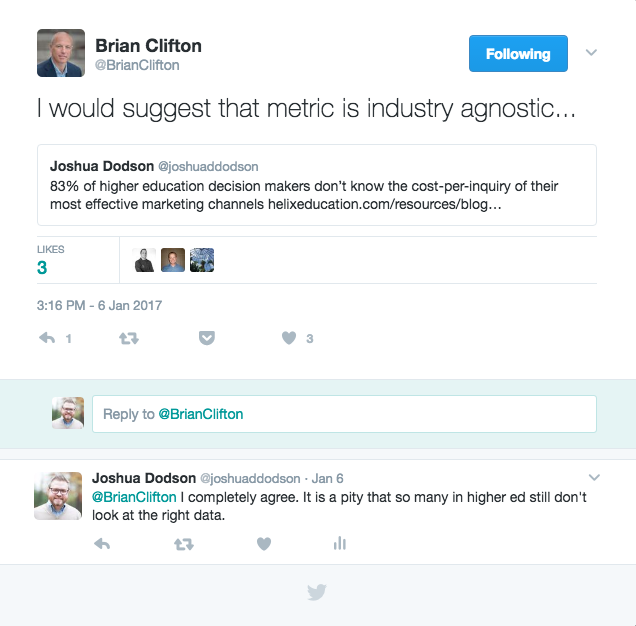We don’t sell shoes, so let’s not be shoemakers
Higher education is a different animal. Everyone working in higher ed knows that.
We don’t sell shoes. We don’t sell inexpensive services.
We sell one of the most significant investments a person will make in their entire life: an expensive, multi-year commitment to education. And, unlike selling shoes, the decision cycle takes a long time. It takes much longer for someone to choose the right university than to choose their next pair of boots. Much longer.
I would posit that it costs a lot more to recruit a student than to sell a pair of shoes, as well. The “2016 Cost of Recruiting an Undergraduate Report” study by Ruffalo Noel-Levitz states, “Four-year private institutions spent the most to bring in new undergraduates in 2015, spending $2,232 per new student at the median vs. $578 per new student and $118 per new student at the median, respectively, for four-year public institutions and two-year public institutions.”
It takes a long time to recruit students and can cost a lot of money to recruit a single student. Given this, one would expect that each dollar is meticulously monitored to understand the return on investment. Educators try to teach students to be good stewards of resources and the world around them. It would make sense for higher ed professionals to display the same care and consideration in how we approach marketing and recruitment. However, a research survey Helix Education recently conducted “of 480 higher education decision makers revealed that 83% don’t know the cost-per-inquiry of their most effective marketing channels.”
I won’t say that I was shocked when I read that statistic, but seeing it there in black and white did make my stomach drop a bit. When I tweeted that stat last month, Brian Clifton (internationally renowned analytics expert and author) retweeted with the comment, “I would suggest that metric is industry agnostic.”
Cost-per-inquiry is an industry agnostic metric, but 83% of higher education decision makers don’t know their cost-per-inquiry. Even if the university’s president or top-level VP doesn’t know the cost-per-inquiry, marketing should.
But, even if we don’t know the ROI of our digital marketing investments, we still have a good handle on what prospective students want on the school’s website, right?
Right? Maybe not.
The study “Mythbusting Websites” from mStoner and Chegg found that 64% of the 1,902 prospective students surveyed prefer text and articles on a college or university’s website, while only 17% of the 520 higher education professionals said that teen prospects placed importance on text and articles. Conversely, 76% of professionals indicated that videos play an important role for prospective students on the school’s website, while only 40% of teen prospects indicated that video was important to them.
Let’s get to work and stop obsessing about vanity analytics
Higher education professionals spend a lot of money to recruit students, don’t know the cost-per-inquiry by marketing channel, and don’t really have a good sense of what prospective students want when they visit the website.
We still have a lot of work to do.
I will be the first to say that this is not true of every school. There are plenty of higher education professionals doing the right things, making the right decisions, and using data instead of gut reaction to guide decisions. However, there are still lots of people who are not doing the right things, not making the right decisions, and are relying more on gut decisions than data.
 We have come a long way in the last few years. I began teaching Web Analytics for Higher Ed in 2011 and have seen hundreds of higher education marketing professionals go through the course (as well as my SEO, advanced analytics, and predictive analytics courses). There is clearly an interest in doing the right thing and learning the skills appropriate to understanding the effectiveness of marketing and recruitment efforts. However, there is also an obvious disconnect.
We have come a long way in the last few years. I began teaching Web Analytics for Higher Ed in 2011 and have seen hundreds of higher education marketing professionals go through the course (as well as my SEO, advanced analytics, and predictive analytics courses). There is clearly an interest in doing the right thing and learning the skills appropriate to understanding the effectiveness of marketing and recruitment efforts. However, there is also an obvious disconnect.
There is a need to go beyond vanity metrics.
Do you know how many people care about the number of visitors to your school’s website?
No one.
No one really cares because that metric doesn’t mean anything.
Do you instead know how many people come to your website from a digital ad and submit an inquiry form to learn more information about your academic programs?
Apparently, around 83% of us don’t know the answer to that question. If we know how much we spend on a marketing channel, and we know how many people from that marketing channel submit the request for information form, then we would know the cost-per-inquiry (cost of the marketing channel divided by the number of inquiries from that channel). This is not rocket science. It is getting the basic right.
Move beyond vanity metrics.
Take the time to understand what is important to your institution and how it can be measured, both via your website and other systems. Use the tools at your disposal to go deeper and connect the dots. Get past website visitors and find value. Use campaign tagging to know how people come to your website from paid channels. Examine the real conversion funnel. Your funnel, which is likely somewhat different than the funnel at other schools (there are always nuances).
Care about the data. It will make you better at your job–and more valuable. Learn the basics and keep going. There is a lot of work to do.
Let’s start doing the work and make higher ed better!
Meet the Faculty: Joshua Dodson
Higher Ed Experts is a professional online school for digital professionals working in universities and colleges.
When you take a professional certificate course with us, you get a chance to upgrade your skills by working on your projects, interacting with classmates just like you and getting detailed personalized feedback from your instructor.
 Joshua Dodson is a Google Analytics qualified web expert who has worked with numerous colleges and universities to improve their web presence and better understand their user trends. Before joining Bentley University as Director of Digital Marketing, Dodson worked as the Director of SEO at SNHU and the Web Strategy and SEO Administrator for Eastern Kentucky University. He has taught hundreds of higher education marketing professionals how to use analytics and SEO through the courses he teaches for Higher Ed Experts.
Joshua Dodson is a Google Analytics qualified web expert who has worked with numerous colleges and universities to improve their web presence and better understand their user trends. Before joining Bentley University as Director of Digital Marketing, Dodson worked as the Director of SEO at SNHU and the Web Strategy and SEO Administrator for Eastern Kentucky University. He has taught hundreds of higher education marketing professionals how to use analytics and SEO through the courses he teaches for Higher Ed Experts.
Joshua teaches Higher Ed Expert’s 4-week online course on Web Analytics for Higher Education as well as 2 other advanced courses and a course on Search Engine Optimization (SEO) for higher ed.
Tags: Higher Ed Experts Faculty, Higher Ed Marketing, Higher Ed News
